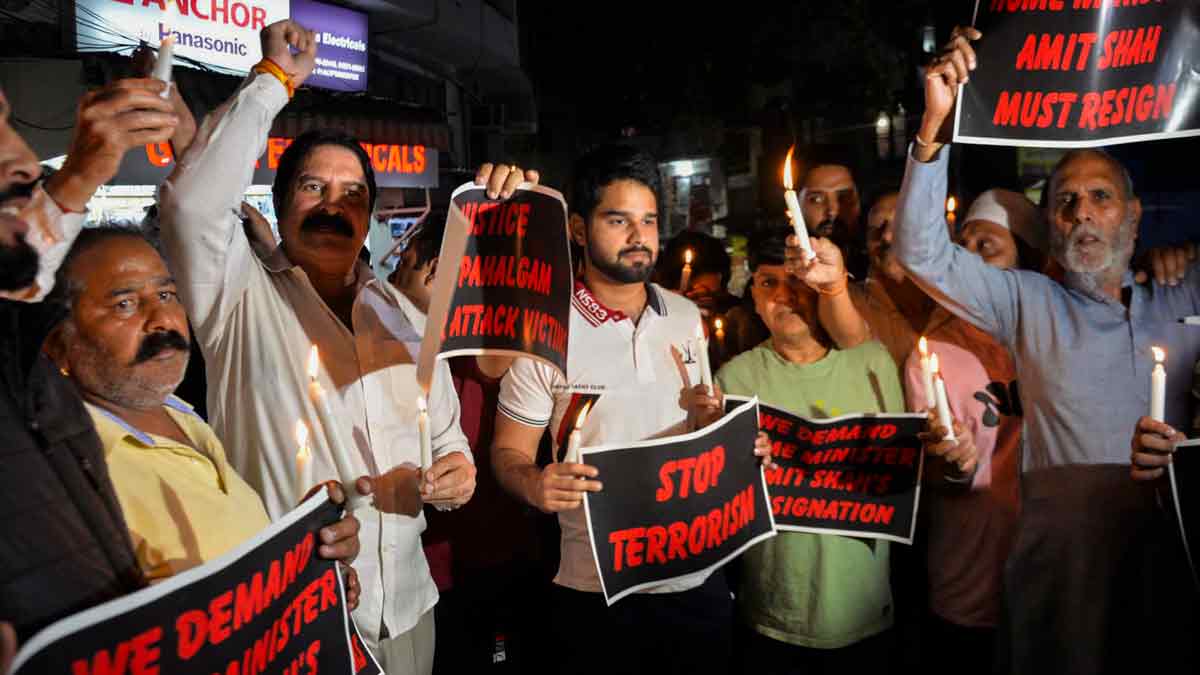Pahalgam terror attack: All eyes on how India will respond
 Youth Congress members hold a candlelight march in Jammu after terrorists attacked a group of tourists at Pahalgam in Anantnag district | PTI
Youth Congress members hold a candlelight march in Jammu after terrorists attacked a group of tourists at Pahalgam in Anantnag district | PTI
The recent terror attack targeting tourists in Kashmir has sparked widespread condemnation across the political spectrum, with calls for a strong response to bring the perpetrators to justice. The incident dealt a severe blow to the state’s tenuous peace after the assembly polls last year, apart from dealing a crippling blow to the region’s economy fuelled by tourism. The attack has also put the seven-month-old Omar Abdullah-led state government under considerable pressure.
At the national level, the Narendra Modi-led NDA government responded swiftly. Union Home Minister Amit Shah travelled to the Valley to assess the situation, while Prime Minister Narendra Modi curtailed his foreign visit, as did Finance Minister Nirmala Sitharaman. With the victims hailing from various states, the central government now faces mounting public and political pressure to ensure swift accountability for a possible intelligence failure and strong action against the terrorists. Modi has asserted that the perpetrators would not be spared.
While investigations by security agencies are ongoing, early leads suggest possible cross-border links.
Notably, the attack coincided with several key international and national developments. Prime Minister Modi was in Saudi Arabia—a Muslim-majority country with which the BJP government maintains strong diplomatic ties. Simultaneously, US Vice President J.D. Vance was making his first official visit to India, and Tahawwur Rana, a Canadian national of Pakistani origin accused of involvement in the 26/11 Mumbai attacks, was recently extradited and being questioned by the NIA.
If the objective of the attackers was to draw international and domestic attention, they may have temporarily achieved that. However, calls for a robust retaliatory response are growing. Comparisons are already being drawn with the 2019 Balakote airstrikes, and voices on the ground suggest that the central government may be compelled to act decisively. Unlike the last time during the Pulwama attack, of 2019, when there was a president’s rule, this time an elected government is in power.
The Balakote air strikes had strengthened the Modi government as the general elections a few months later gave it a decisive mandate in 2019.
With tensions in Manipur still fresh in public memory, there is a consensus that Kashmir cannot be allowed to become another prolonged security and political flashpoint. Amarnath Yatra is also set to start in July. A large number of pilgrims visit the valley, many of them using the Pahalgam route to reach the holy cave.
Some of the Opposition parties have suggested the government call an all-party meeting so that the lawmakers may be briefed on the incident and there will be a singular message emerging from the political class.
The Modi government may come out with a political and strategic response to the terror attack. The BJP had often criticised the UPA government for inadequate response to the terror attacks. Even several Sangh organisations including VHP have called for exemplary action against the terrorists.
The next few weeks will be important as the central government crafts such a response based on the security inputs.
India